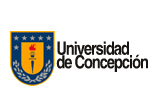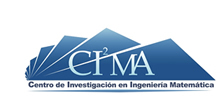News
Experts developed a model applied to four thermal power plants in Biobío and Valparaíso that inspired a paper soon to be published in the prestigious journal Applied Energy
Currently, concern about the consequences of various human activities on the planet that houses us is a permanent element and, especially, the energy generation sector is one that is generally associated with negative impacts on the environment. Faced with this scientific challenge, called the 'Problem of the Environmental Economic Dispatch (DEA)', a group of researchers from the Universidad de Concepción, UdeC, developed a study that will be published in the next few days in the prestigious specialized journal Applied Energy (AE), under the title Effect of models uncertainties on the emission constrained economic dispatch. A prediction interval-based approach.
.jpg) “In general”, Dr. Adrián Carrillo-Gálvez explains, “the objective pursued with the thesis was to more rigorously analyze the DEA, a well-known and important problem in electrical engineering, because, through its solution, it is possible to establish electricity generation programs that are economically favorable and have a lower environmental impact”.
“In general”, Dr. Adrián Carrillo-Gálvez explains, “the objective pursued with the thesis was to more rigorously analyze the DEA, a well-known and important problem in electrical engineering, because, through its solution, it is possible to establish electricity generation programs that are economically favorable and have a lower environmental impact”.
“In particular, this work was derived from concerns and unresolved questions that arose in previous works and is part of my thesis for the PhD Program in Applied Sciences with a minor in Mathematical Engineering from the UdeC, which was carried out under the tutorship of Professor Fabián Flores of the Department of Mathematical Engineering”, Carrillo details.
Regarding the importance of the publication in Applied Energy, Carrillo explains that “it is a reference journal in energy engineering and has high visibility, which is evidenced by its impact factor of 9,746 points, which implies that experts in the area of energies see our research questions and the way we provide solutions as valid. This type of acceptance motivates us to continue researching and trying to contribute to these more applied and everyday topics, from mathematics”.
The article was co-authored by Drs. Carrillo-Gálvez, Flores-Bazán and Dr. Enrique López Parra, from the Department of Electrical Engineering of the UdeC Faculty of Engineering, an expert in reliability optimization of electrical energy systems, since, Carrillo says, “it was not totally clear to us, evidently from the ignorance that implies not being an expert in this area, how the mathematical models that characterize the operation of electricity generating plants were obtained, in real and daily operation. This led us to inquire about the subject, to understand that this process is mostly carried out in an approximate way and that these approximations obviously have associated uncertainties that can negatively influence the quality of the solutions found, once the DEA has been solved, which is mathematically a problem of optimization”.
.jpg) In this regard, Dr. Fabián Flores-Bazán points out that “considering the current water scarcity, for example, the problems addressed by Adrián in his doctoral thesis are especially relevant in our times. Adrián, whose undergraduate training was on Mechanical Engineering, never skimps on wanting to address, in his thesis, problems that come from the real world. In particular, he began with the study of a two-criteria quadratic optimization model of the environmental economic dispatch problem; to then deal with the effect of models with uncertainty on emissions”.
In this regard, Dr. Fabián Flores-Bazán points out that “considering the current water scarcity, for example, the problems addressed by Adrián in his doctoral thesis are especially relevant in our times. Adrián, whose undergraduate training was on Mechanical Engineering, never skimps on wanting to address, in his thesis, problems that come from the real world. In particular, he began with the study of a two-criteria quadratic optimization model of the environmental economic dispatch problem; to then deal with the effect of models with uncertainty on emissions”.
And, regarding the progress made in the study, Carrillo, who received his doctorate from the UdeC last January, highlights that “we were able to find and propose a mathematical formulation of the problem that was different from the usual ones. In said formulation we consider, in a certain way, these uncertainties associated with the actual operation of the electricity generation units, and we also observe the negative environmental effect that not considering the uncertainties can cause”.
Carrillo explains that multidisciplinary collaboration is very relevant when considering complex scientific problems, an element that “was a fundamental part of my motivation to join the PhD program”, and in terms of new lines of research that could be opened from these results, the expert highlights that “it would be interesting to study other models used to characterize the operation of electricity generation units, since, at present, there are more complex operating models in the literature that increase the accuracy of the characterization of the operation. of the generating units”.
“It is important, then, to include this type of models, to research on how accurate estimates of the coefficients that compose them can be obtained and how to adequately manage the uncertainties associated with said estimates”, says Carrillo, who carried out his thesis research at the Center for Research in Mathematical Engineering, CI²MA, of the UdeC, which, since its foundation in 2009, hosts the activities of the PhD Program in Applied Sciences with a minor in Mathematical Engineering of this university.
Regarding the scalability of the model developed in the study, Carrillo states that “from the computational implementation point of view, much remains to be done as well. In this work, the problem solved was small, given that we only consider four coal-fired generating units operating in Chile, but we consider that, for large electric power networks, computational efficiency will be decisive in the real applicability of our results; therefore, efficient optimization algorithms must be analyzed and proposed”.
“In fact, thanks to a four-month research grant provided by the Center for Mathematical Modeling, CMM, of the Universidad de Chile, we are currently deepening the computational approach to the problem studied. In particular, we are trying to develop an open-source computational tool, which encompasses all the threads necessary to obtain solutions to the DEA”, he highlights.
In this matter, Dr. Flores-Bazán emphasizes that “Adrián has done an excellent job in the three articles that came out from his thesis work. This was reflected when he became a creditor of this research scholarship granted by the CMM”.
This study focused on the analysis of two thermoelectric plants of the Bocamina complex and one of the Santa María facility, all in Coronel, Biobío Region, as well as another in Campiche, Valparaíso Region, and was financed through several sources such as the Carrillo-Gálvez National Doctorate Scholarship (ANID 2017-21170239), and the projects Fondecyt 1212004, PIA/Basal AFB170001, Basal FB210005, ACE210010, in addition to contributions from the UdeC Graduate School.

